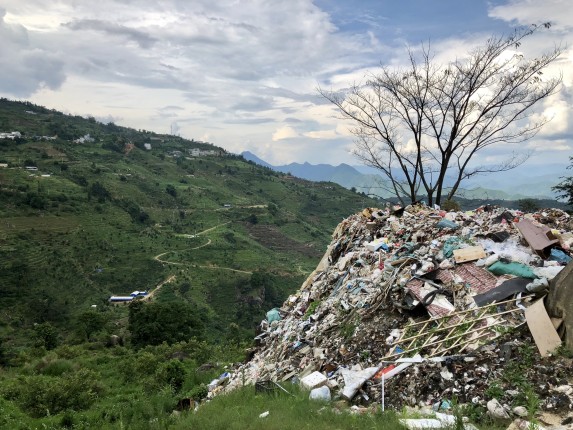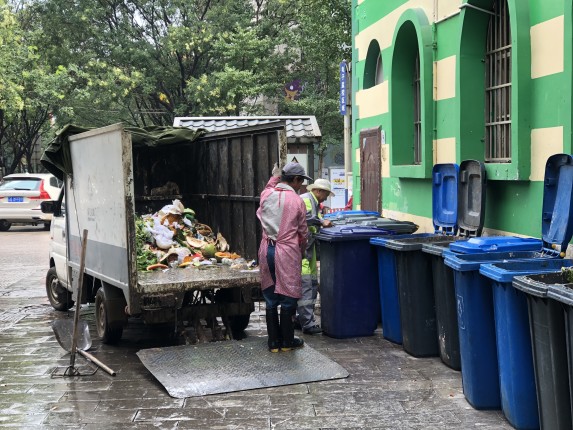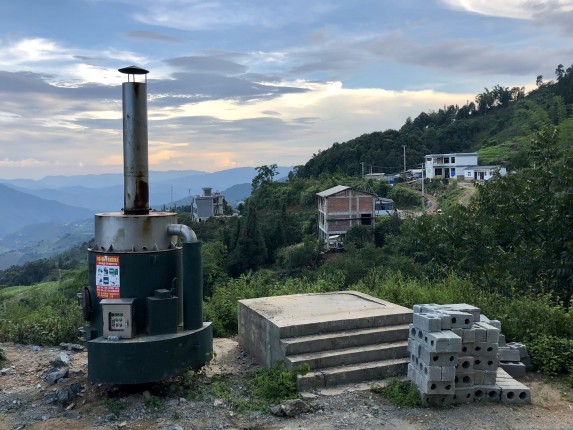-
Out of Sorts: Rural Waste Problems in China and the United States
October 15, 2020 By Yining Zou
In Bangdong Village, Yunnan, Matthew Chitwood wanted to do his part to keep the stunning mountainous area clean during his two-year residency as a China fellow at the Institute of Current World Affairs. One day he took his empty beer bottles to a local convenience shop for recycling, but the owners would not accept them. He was told to dump them over the embankment. Looking down the slope at the accumulated piles of broken furniture, soggy socks, food waste, and crushed soda cans entangled with plastic bags, Matt refused. Later, Matt’s friends flung his bottles into the gully. He related his frustrating recycling attempt to Mao Da, the founder of China Zero Waste Alliance, who told Matt that “rural trash management itself is a misnomer… It’s really just trash relocation.”
40 percent of China’s population lives in rural areas and generates more than 280 million tonnes of waste a year. Single-use plastics make up a large proportion of this mountain of trash. Chinese cities themselves are struggling to manage the 100 million plastic waste containers generated every day from the food delivery industry, as well as the tsunami of e-commerce plastic packaging. The explosion of this waste has galvanized reforms in urban waste management, but waste infrastructure is still scarce in rural China.

China’s central government has developed and funded a rural waste management system in which village waste workers collect trash from households, then township workers transfer household waste to county infrastructure for recycling, landfilling, or incineration. According to the plan set forth by China’s Ministry of Housing and Urban-Rural Development, by the end of 2020 this central government-supported waste management system will cover more than 90 percent of rural areas in eastern and mid-western China. However, some Chinese researchers argue that this system relies heavily on upper-level government funding and once it disappears, county and village-level governments will not be able to sustain it. Even more troubling, many of the rural incinerators and landfills are not well operated and do not meet environmental standards. Village waste workers are also understaffed and unable to do comprehensive waste collection and shipping.
In 2018, the Chinese government launched a 47-city waste reform pilot program to help improve urban waste collection and increase recycling rates. For rural areas to get their plastics to recycling facilities there is an urgent need to build out extensive waste collection and sorting. The most promising area of development has been efforts to sort and process kitchen waste. Kitchen waste makes up about 50 percent of China’s waste stream, and in rural areas it can reach 70 percent. Alternately, the food waste can be combined with animal waste and used as feedstock for small anaerobic digesters that generate electricity for rural households.
In China, Turning Rural Kitchen Waste to Gold
Chen Liwen, the founder of Zero Waste Village, believes that rural China has unique advantages over urban areas in dealing with food waste. Rural villagers can feed food waste to livestock, and then turn the manure into fertilizer. Importantly, separating wet kitchen waste helps increase supply of recyclable plastics and reduces pressure on landfills and dioxin contamination from incinerators.
Chen Liwen has helped more than 24 villages around China set up new waste sorting programs. Understanding that behavioral change is difficult, she starts by allocating two buckets to each household—a yellow one for non-compostable trash and a green one for compostable waste. She usually spends a few months in each town engaging the heads of local women’s associations, who keep the waste sorting on track after she leaves. Chen’s efforts have had a significant impact—the monthly amount of waste going to landfills or incinerators in these villages decreased by 50 to 70 percent.

Pushing Companies to Swallow Costs
In many U.S. rural communities, trash collection and recycling is the second-most expensive item in local government budgets after schools. The State of Maine is working to fix this cost burden by creating an extended producer responsibility (EPR) law. EPR laws mandate that companies shoulder the costs of collecting and recycling plastic packaging they produce. Troy Moon, the sustainability coordinator for Portland, Maine believes rural communities will especially benefit from the new law.
The Natural Resources Council of Maine (NRCM) found that Maine’s government and citizens pay $16-$17.5 million annually to manage packaging waste. Chrissy Adamowicz from NRCM says that EPR can help to equalize not only the uneven burden between consumers and producers, but also the unequal recycling development between urban and rural areas. “We were living a lie before and we didn’t ask where our waste was going. Now we are more aware how badly the system was operating,” said Adamowicz in a recent interview. When companies have to pay cradle-to-cradle costs and manage their product’s packaging waste, producers have incentives to make their products and packaging more recyclable or durable. An EPR system could create a stable source investment in recycling infrastructure for rural areas.
In 2016, China’s central government started establishing regulations pushing producers to be responsible for their products, including some voluntary guidelines for recycling and biodegradable packaging. Speaking at a recent Wilson Center event, Mao Da said that China issued more guidance documents in late 2019 encouraging manufacturers to reduce plastic packaging and many provinces are issuing bans on some single-use plastics. All of these efforts are laying the groundwork for an eventual EPR law, which will benefit both urban and rural areas.
Information of Chen Liwen, Troy Moon, Chrissy Adamowicz are from interviews
Yining Zou is a research assistant at the Wilson Center’s China Environment Forum. She earned her master’s degree in public policy at McCourt School of Public Policy, Georgetown University.
Sources: CBNData, EPA, ICWA, Matthew Chitwood, MDPI, Ministry of Ecology and Environment of People’s Republic of China, Ministry of Housing and Urban-Rural Development of the People’s Republic of China, Minnesota Pollution Control Agency, New Security Beat, NPR, NRCM, Our World Data, Pew Trusts, ReFED, Slate, State Council of the People’s Republic of China, Washington Post, Waste Dive, Waste360, World Health Organization, Xinhua Net
Lead Photo Credit: A mountain of trash, used with permission courtesy of Matthew Chitwood. All Rights Reserved.
 A Publication of the Stimson Center.
A Publication of the Stimson Center.








